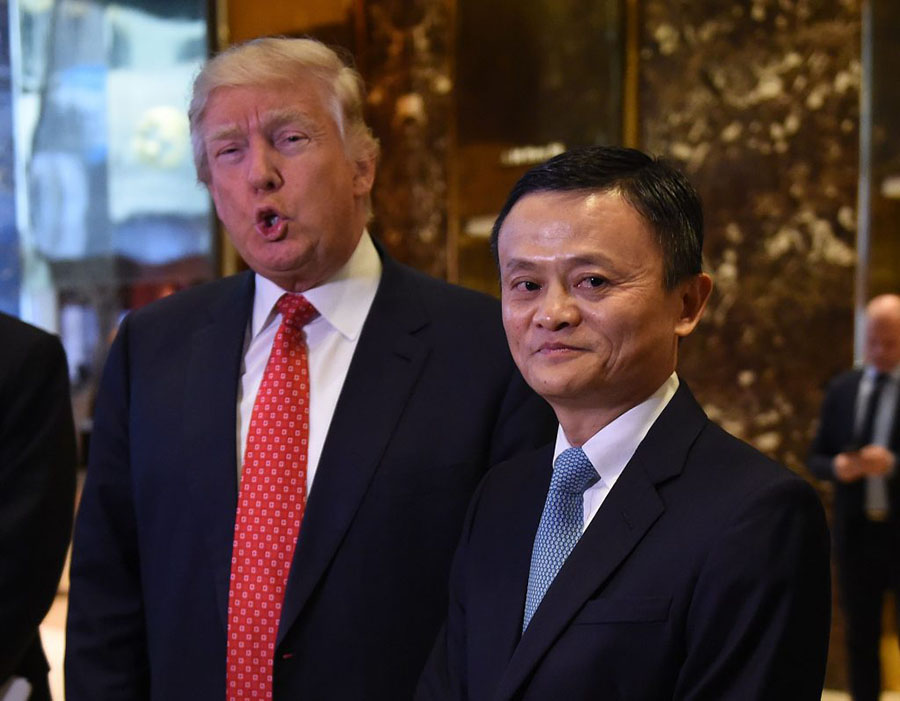Media Report

- USA Today reports: "When Jack Ma, executive chairman of Chinese mega-company Alibaba, met with President Trump in January, he made a promise – the online sales platform would give 1 million U.S. small businesses entrée to the Chinese market. On Tuesday, Ma will announce he's launching a program to make good on that promise. Alibaba plans a conference in Detroit on June 20 and 21 to teach U.S. businesses how to sell to the company's 443 million customers in China...Over the next five years, Alibaba hopes to increase that to more than 1 million, with the vast majority made up of small businesses. When Ma met with then president-elect Trump, he said the plan would create 1 million U.S. jobs. As a first step towards that, the company hopes to invite as many as 2,000 U.S. small business owners, entrepreneurs, and farmers to Detroit, focusing on products it believes Chinese consumers want. The aim is three-fold. First, Alibaba needs to educate attendees about the business opportunity that China represents. Next it plans to tell them how the nuts and bolts work of selling to China is done, everything from finding a partner company in China to the logistics of shipping, to dealing with foreign exchange. Finally it will play matchmaker, introducing Americans to small Chinese businesses that maintain digital storefronts on Alibaba's Tmall site."
- The Wall Street Journal comments: "On May 13, Beijing will host a summit meeting of countries participating in its massive infrastructure initiative known as 'One Belt, One Road'...OBOR and the associated Asian Infrastructure Investment Bank (AIIB) raise important geostrategic questions: What risks will OBOR recipients incur when all roads lead to Beijing? How will China extract its pound of flesh from developing nations who borrow but cannot repay? Will OBOR facilitate China's overseas military basing? Putting those concerns aside, some in the U.S. agree with Mr. Xi that OBOR offers investment opportunities. There are several problems with this view...First, it was announced in 2013, meaning it was conceived using financial assumptions that are now unrealistic...Second, OBOR outlays are snowballing as other huge ventures with dubious returns take ever-bigger bites of China's finances...Third, the initiative is unlikely to deliver on its promises. A 2016 report from the Center for Strategic and International Studies states Chinese officials privately expect to lose 30% of their investments in Central Asia, 50% in Myanmar and 80% in Pakistan."
- The Washington Post reports: "China's conversion of coal into natural gas could prevent tens of thousands of premature deaths each year. But there's a catch: As the country shifts its use of vast coal reserves to send less smog-inducing chemicals into the air, the move threatens to undermine efforts to rein in greenhouse gas emissions, researchers said Tuesday. The environmental trade-off points to the difficult choices confronting leaders of the world's second largest economy as they struggle to balance public health and financial growth with international climate change commitments...China's immediate drive to clean up local air quality could be addressed by using coal-produced synthetic gas, said study co-author Denise Mauzerall, a professor of environmental engineering and international affairs at Princeton University. Doing so, however, 'would have an effect of increased carbon emissions, which would affect the world,' Mauzerall said...The coal-to-gas plants in China combined could emit as much as 158 million tons (143 million metric tons) of additional carbon dioxide annually, according to Mauzerall and her colleagues. Greenpeace forecasts even more — up to 451 million tons (409 million metric tons) of extra carbon dioxide annually by 2020. That's about 4 percent of China's 2016 total emissions"
Calendar
- 2017-04-24 China’s Leader Urges Restraint on North Korea in Call With Trump
- 2017-04-23 Chinese jihadis' rise in Syria raises concerns at home
- 2017-04-21 Is China too tough a steel beast for Trump to tame?
- 2017-04-20 Philippines checks report of 'harassment' near China-controlled reef
- 2017-04-19 China's Xi restructures military, consolidates control
- 2017-04-18 Ivanka Trump awarded trademark approval in China, dines with Chinese president at Mar-a-Lago
- 2017-04-17 Pence Visits North Korea Border, `Heartened' by China Moves
- 2017-04-14 China Warns of ‘Storm Clouds Gathering’ in U.S.-North Korea Standoff
- 2017-04-13 Trump Says China Won't Be Labeled a Currency Manipulator
- 2017-04-12 Xi and Trump Discuss Rising Tensions With North Korea
News
- USA Today Alibaba launches program to help 1 million U.S. businesses sell to China
- The Washington Post Converting coal would help China's smog at climate's expense
- The New York Times China Bans 'Muhammad' and 'Jihad' as Baby Names in Heavily Muslim Region
- The Wall Street Journal China Markets Stress Reaches Bonds
- Reuters Japan's ruling party heavyweight to attend China's New Silk Road summit
- NPR Trump's First 100 Days: China Policy
- The Financial Times Ideological purge hits China universities with western ties
- Bloomberg Inside China's Plans for World Robot Domination
- Reuters China targets 35 million vehicle sales by 2025, NEVs to make up one-fifth
- The Associated Press Thai gov't approves purchase of $393M submarine from China
- Bloomberg Hyundai Is Caught in a Perfect Storm in China
- The Associated Press China won't let its construction crews work in West Bank
- The Financial Times China bails out Pakistan with over $1bn in loans
Commentary
- The Wall Street Journal: Opinions The Folly of Investing in China's 'One Belt, One Road'
- The Washington Post: Opinions China brazenly arrests a Taiwanese activist — and the Trump administration says nothing
- Dallas News This day in Trump, Day 95: Trump pushes for wall funding in budget showdown; China urges caution over North Korea
- TIME Chinese President Xi Jinping Urges Donald Trump to 'Avoid Aggravating' North Korea
- Barron's Here's Why Tesla Can't Go Far in China
- The Diplomat What's Behind The New China-Malaysia Defense Committee?
- Quartz This may be one reason people in China are becoming less happy
